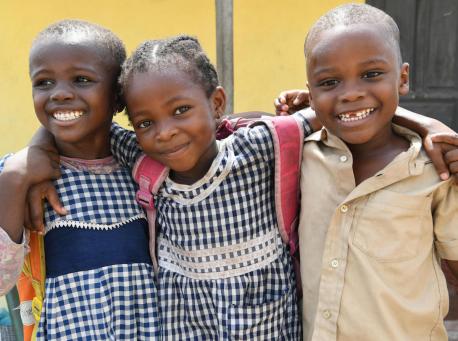
How White People Can Talk to Their Kids About Racism
Six steps white parents can take to help their children think about racial injustice, implicit bias and how to be an ally.
Speaking openly about racial issues makes many adults uncomfortable, but we can't solve a problem if we can't talk about it. Racism thrives in silence. Here are some steps white parents can take to start the conversation with their children, and help them learn how to fight racist practices and stand up for every person's right to be treated with dignity and respect.
1. Talk about fairness
Even preschoolers are old enough to understand the concept of fairness. Racism is a system of unfairness, in which Black people are treated worse than white people. That's wrong and we all need to work hard to fix it.
If your kids have seen reports of police brutality in the news, talk about how upsetting it is to see people treated unfairly, and how mistreatment of Black people is part of a bigger picture. Explain that there is a multiracial coalition of people working together to protest racism and make the world a safer place for all of us. We can all be helpers.
2. Encourage children to ask questions
All children have questions about race, skin color and other differences. But when parents are uneasy talking about race, children learn early on to avoid bringing it up. When people say their kids are "color blind," what they really mean is that their kids have been trained not to talk about difference.
3. Celebrate differences
Parents can help children learn about differences in a positive way from an early age. Give your kids the vocabulary words they need to talk about what they see. Hair, skin and eye color depend on how much and what type of melanin a person has. Some people have more melanin in their skin than others. But all people are the same on the inside.
4. Build a library together
Read books together about racism and protest. Choose stories with Black heroes and heroines. Further your own knowledge by reading books on antiracism and race recommended by Black booksellers and publishers.
5. Teach kids how to be an ally
Being an ally means making it clear that you care about other people and you're willing to stand with them. Teach your kids to be witnesses: if they see a Black classmate being treated unfairly, for example, they should say that's not okay. If they hear someone make a racist joke or comment, they should speak up and say that's wrong. Explain that what makes actions harmful is impact, not intent.
6. Keep the conversation going
The legacy of slavery is very much a part of life in the U.S. today. It's important to acknowledge that all of us have internalized the rules of a society that is separate and unequal by race. Interrupting the cycle of racism requires vigilance in our daily lives — we need to be on the lookout for ways that we perpetuate the bias embedded in American culture.
Standing up against injustice is part of being a good citizen. All children deserve to grow up in a world where they are safe and protected.
More resources for raising anti-racist kids:
- UNICEF's age-appropriate tips for talking to children about racism
- NPR's "Talking Race with Young Children"
- Anti-Racism for Beginners: a Tool Kit
- "Something Happened in Our Town: A Child's Story About Racial Injustice" (for ages 4 to 8)
- "Little Leaders: Bold Women in Black History" (for ages 8 to 11)
- "Stamped: Racism, Antiracism and You" (for ages 12 and over)
- Coretta Scott King Book Award Winners: books for children and young adults
Top photo: Happy friends leaving their school in Gonzagueville, a suburb of Abidjan, the capital of Côte d'Ivoire. © UNICEF/UN0288500/Frank Dejongh
HOW TO HELP
There are many ways to make a difference
War, famine, poverty, natural disasters — threats to the world's children keep coming. But UNICEF won't stop working to keep children healthy and safe.
UNICEF works in over 190 countries and territories — more places than any other children's organization. UNICEF has the world's largest humanitarian warehouse and, when disaster strikes, can get supplies almost anywhere within 72 hours. Constantly innovating, always advocating for a better world for children, UNICEF works to ensure that every child can grow up healthy, educated, protected and respected.
Would you like to help give all children the opportunity to reach their full potential? There are many ways to get involved.





